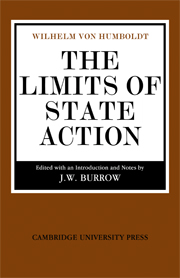Book contents
- Frontmatter
- Contents
- Editor's Introduction
- ON THE LIMITS OF STATE ACTION
- NOTE ON THIS EDITION AND TRANSLATION
- Contents
- CHAPTER I Introduction
- CHAPTER II Of the individual man, and the highest ends of his existence
- CHAPTER III On the solicitude of the State for the positive welfare of the citizen
- CHAPTER IV Of the solicitude of the State for the negative welfare of the citizen—For his security
- CHAPTER V On the solicitude of the State for security against foreign enemies
- CHAPTER VI On the solicitude of the State for the mutual security of the citizens—Means for attaining this end—Institutions for reforming the mind and character of the citizen—National education
- CHAPTER VII Religion
- CHAPTER VIII Amelioration of morals
- CHAPTER IX The solicitude of the State for security more accurately and positively defined—Further development of the idea of security
- CHAPTER X On the solicitude of the State for security with respect to actions which directly relate to the agent only (Police laws)
- CHAPTER XI On the solicitude of the State for security with respect to such of the citizens' actions as relate directly to others (Civil laws)
- CHAPTER XII On the solicitude of the State for security as manifested in the juridical decision of disputes among the citizens
- CHAPTER XIII On the solicitude for security as manifested in the punishment of transgressions of the State's laws (criminal laws)
- CHAPTER XIV On the care of the State for the welfare of minors, lunatics, and idiots
- CHAPTER XV Measures for the maintenance of the State—Completion of the theory
- CHAPTER XVI Practical application of the theory proposed
- Other works by Wilhelm von Humboldt
- Select Bibliography
- Index
- CAMBRIDGE STUDIES IN THE HISTORY AND THEORY OF POLITICS
CHAPTER VIII - Amelioration of morals
from ON THE LIMITS OF STATE ACTION
Published online by Cambridge University Press: 05 February 2015
- Frontmatter
- Contents
- Editor's Introduction
- ON THE LIMITS OF STATE ACTION
- NOTE ON THIS EDITION AND TRANSLATION
- Contents
- CHAPTER I Introduction
- CHAPTER II Of the individual man, and the highest ends of his existence
- CHAPTER III On the solicitude of the State for the positive welfare of the citizen
- CHAPTER IV Of the solicitude of the State for the negative welfare of the citizen—For his security
- CHAPTER V On the solicitude of the State for security against foreign enemies
- CHAPTER VI On the solicitude of the State for the mutual security of the citizens—Means for attaining this end—Institutions for reforming the mind and character of the citizen—National education
- CHAPTER VII Religion
- CHAPTER VIII Amelioration of morals
- CHAPTER IX The solicitude of the State for security more accurately and positively defined—Further development of the idea of security
- CHAPTER X On the solicitude of the State for security with respect to actions which directly relate to the agent only (Police laws)
- CHAPTER XI On the solicitude of the State for security with respect to such of the citizens' actions as relate directly to others (Civil laws)
- CHAPTER XII On the solicitude of the State for security as manifested in the juridical decision of disputes among the citizens
- CHAPTER XIII On the solicitude for security as manifested in the punishment of transgressions of the State's laws (criminal laws)
- CHAPTER XIV On the care of the State for the welfare of minors, lunatics, and idiots
- CHAPTER XV Measures for the maintenance of the State—Completion of the theory
- CHAPTER XVI Practical application of the theory proposed
- Other works by Wilhelm von Humboldt
- Select Bibliography
- Index
- CAMBRIDGE STUDIES IN THE HISTORY AND THEORY OF POLITICS
Summary
The last means which States customarily use in order to reform morality in accordance with their design of maintaining security, is the influence of special laws and enactments. But as these are indirect measures towards virtue and morality, special provisions of this nature can naturally do nothing more than prohibit particular actions of the citizens, or mark out those which, without directly infringing the rights of others, are either positively immoral or are likely to lead to immorality.
To this class of institutions all sumptuary laws in particular belong. For, it is evident, there is no such common and fertile source of immoral, and even lawless actions, as an excessive propensity of the soul towards the sensual, or the general disproportion between men's desires and impulses, and the means of satisfaction which their external position affords. When continence and moderation make men satisfied with their allotted sphere, they are less inclined to try to infringe the rights of others or to do anything likely to disturb their happiness and contentment.
It would seem therefore consistent with the true end of the State, to confine luxury within due bounds, since it is the source from which all clashes between man and man arise (for where spiritual feeling is predominant there can always be harmony); and since it seems the simplest and easiest method, it might be argued that the State should try, as far as possible, to suppress love of luxury altogether.
- Type
- Chapter
- Information
- The Limits of State Action , pp. 71 - 81Publisher: Cambridge University PressPrint publication year: 1969

